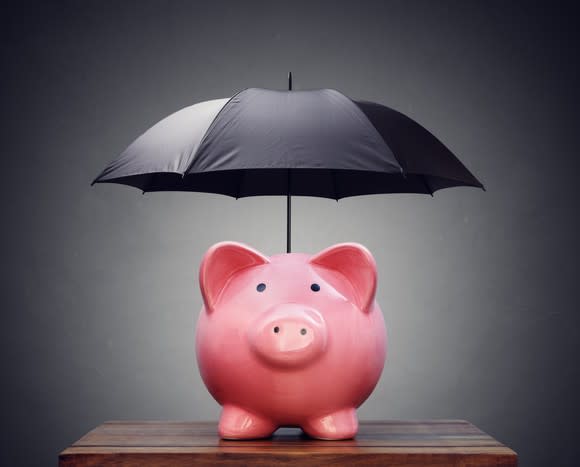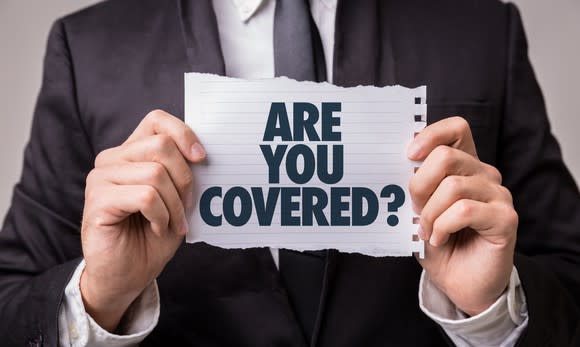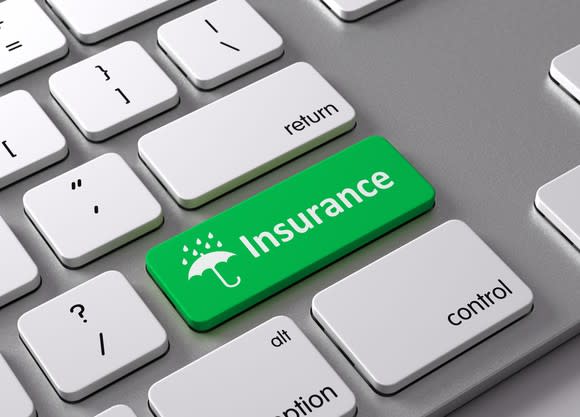15 Smart Insurance Moves You Can Make Right Now
Few people enjoy thinking about or dealing with insurance, and even fewer people probably enjoy paying for it. But many kinds of insurance are important or vital, so it's worth learning about smart insurance moves we might make in order to pay less and/or better protect ourselves. Here's a look at 15 smart insurance moves. See how many you can act on.
1. Increase your deductible
For many kinds of insurance -- car, home, health, and so on -- your policy will feature a deductible. That's the amount you're on the hook for before the insurer will pay. Low deductibles can seem great, as you won't have to produce a lot of cash after a car accident or flooded basement, but overall, a higher deductible can be better. After all, you can go many years without a claim and your monthly premiums can be significantly lower throughout that period.
Try calling your various insurers and asking how much lower your premiums would be if you increased your deductible. You may be able to save anywhere from 5% to 25% or more. Never hike your deductible to a level that you can't pay if you need to, of course.

Image source: Getty Images.
2. Shop around for lower rates
Another tip that applies to many kinds of insurance is very basic: Shop around for the lowest rates. Don't just stick with your same old insurer, even if you're receiving a "loyalty" discount. Spend an hour on the phone with a few competitors and compare apples to apples, specifying exactly what coverage you have and seeing what they would charge you. You don't want to end up with a lower price that's due to less coverage.
Give special consideration to any insurer you already have a policy with, as multiple policies can yield discounts. And keep an insurer's reputation in mind, too. Don't switch to one that's not rated highly.
3. Maintain a clean driving record for lower car insurance rates
A great way to keep your car insurance rates low is to have a clean driving record. A single accident can send your rates up by as much as 41%, on average, for a $2,000 claim, per one report. Drivers with clean records get offered much better rates when shopping for a policy, too. You'll want to avoid not only accidents, but also speeding tickets, DWI offenses, and more.
If you happen to have an incident on your driving record, it won't be there forever. Its effect on your premiums will likely be reduced over time, and it might not make any difference at all after a few years. It can also help if you drive less. If you become a telecommuter and are driving much less now, let your insurer know, as your rate might drop. The fewer miles you drive, the less risk you present for an insurer.
4. Own certain cars for a long time for lower car insurance rates
Insurers view every make and model of vehicle differently. Do a little Googling, and you'll find lists of the most costly and least costly vehicles to insure, and lists of the safest and least safe vehicles. Insurers favor safer cars and are likely to charge higher rates for cars that are associated with more claims and less-than-stellar drivers. Cars with a lot of safety features will be favored, too, while expensive cars will cost you more.
According to Insure.com, among 2017 models, the least expensive cars to insure include the Honda Odyssey LX, Jeep Renegade Sport, Subaru Outback 2.5l, and the Buick Encore, with average annual rates below $1,200. The most costly vehicles to insure include the Mercedes S65 AMG convertible, the Dodge GTS Viper, and the Maserati Quattroporte GTS, with average annual rates topping $3,000. If you tend to replace your car every few years, you're keeping your rates on the steep side. Older cars can be far less costly to insure, and after a certain point, you might just drop your collision coverage entirely, saving even more.

Image source: Getty Images.
5. Get life insurance if you need it
Don't assume that because you're only 25, or because you have no children, you don't need life insurance. If anyone depends on you financially -- your partner, children, parents, or even nephews or nieces -- you need life insurance. Think, too, of anyone who has cosigned any loan for you, such as your parents, who might have helped you with school loans or a mortgage. If you expire ahead of schedule, you don't want to leave them stuck with repayments.
We tend to ignore the possibility that we might die prematurely, but it happens to many people, and often by surprise. You don't necessarily need a multi-million-dollar whole life policy. A relatively inexpensive term policy can be just fine, lasting only as long as you need it.
6. Consider a "life settlement" if you no longer need your life insurance
If you have a whole life insurance policy and you don't need life insurance anymore, you may see little reason to keep paying those premiums. You can probably cash out and receive some money from the insurer -- or you can look into a "life settlement," which might pay more, though less than the face value of the policy, which is the amount that would be paid upon your death. With life settlements, a third party will buy your life insurance policy if it likes its odds of making a profit on it -- often paying between 10% and 25% of your policy's face value.
7. Think twice before filing a claim
If a tree falls on your house and splits it in two, of course file a claim with your insurer. But if you have a small claim, you might be best off not mentioning it. With several kinds of insurance, such as car and home, the more claims you file, the more your premiums likely will be increased. According to a CNNMoney article, "On average, filing a single claim -- for anything ranging from a stolen bicycle to tornado damage -- will result in your monthly premium being raised by 9%, according to a report released by InsuranceQuotes.com. File a second claim and premiums climb by an average of 20%."

Image source: Getty Images.
8. Know what your home insurance covers
It's very important to understand your policy well and to know what it does and doesn't cover. If you're worried about earthquakes, for example, most policies don't protect against them unless you add coverage for that, and pay extra. Be sure you understand what your policy will do in the event of a big catastrophe, too.
For example, don't think that if you bought your house for $200,000 years ago that you're good with a policy that will pay $200,000 if your home burns down. Rebuilding costs change over time, so check your policy now and then, and make sure it meets your needs. Understand, too, how you'll be compensated for lost property. Will you receive what it will cost to replace your possessions or just their depreciated value at the time of loss?
9. Seek discounts
You may be able to get a small or big discount on your home insurance policy by reducing the insurer's chances of a big claim -- for example, by weatherproofing your home with storm windows or installing deadbolt locks and a security system. Ask your insurer what steps will yield specific discounts. Most desirable for some insurers is a fancy security system that will automatically call the police or fire department if it senses a problem, or a sprinkler system that might keep a fire from getting out of control.
You might even get a lower rate if you work at home, for example, because you're around more, leaving the house less vulnerable. Car insurance policies might feature discounts if your car has some passive safety or anti-theft features. With any insurance, it can't hurt to ask which discounts are available for you. Seniors might qualify for some special discounts, too.
10. Keep your beneficiaries in order
With any policy that features beneficiaries, be sure you've designated some. Naming only one person as your beneficiary isn't best, since that person might expire before you do. Or if it's your spouse, you might both die at the same time, such as in an accident. So name a secondary and even tertiary beneficiary. They won't be sharing the policy payout unless the primary beneficiary isn't around.
Naming children as beneficiaries is common, but it can be a bit tricky, so consider consulting an estates and wills lawyer if you're not sure what the best arrangement is for you. Above all, tell whoever your beneficiaries are that you have a policy and they're named in it. Be sure they're aware of where the paperwork is, too.
11. Think twice before buying critical illness insurance
Medical costs are sky-high in America, but that doesn't make critical illness insurance a no-brainer. Different policies will cover different diseases and conditions and will have different terms. Commonly covered diagnoses include cancer, heart attack, stroke, major organ failure, end-stage heart failure, coronary artery bypass disease, Alzheimer's disease, deafness, blindness, benign brain tumor, severe burns, paralysis, comas, and more. A downside to it is that you might end up fighting a disease other than the one(s) you're insured against.
You might be able to protect yourself financially in other ways, though, such as by stockpiling funds in a Health Savings Account (HSA). You also simply might set up a separate fund for health-related emergencies, contributing money to it regularly until it's as stocked as you need it to be.

Image source: Getty Images.
12. Think twice before buying "pre-need" funeral insurance
Yes, death-related costs can be steep, but "pre-need" funeral insurance -- or a pre-need arrangement, as it's sometimes called -- isn't always worth it. For starters, it generally isn't portable to future areas where you live or want to be buried, and it can still result in your paying more when the time comes. Still, if you really think it might be worth it for you, read all the fine print on whatever you sign. You don't want to end up surprised.
13. Consider pet insurance
You probably know that when pets are very ill, it can be very costly to treat them -- and can leave you with some tough decisions to make. Thus, you might want to look into pet insurance. It's not always a smart move, but depending on your situation and your pet, it might be. Average annual costs a few years ago were $465 for a dog and $316 for a cat.
14. Bundle your insurance
You can get lower rates overall by buying your home insurance, car insurance, and other kinds of insurance from the same company. Your overall rates may be as much as 5% to 15% lower. Do your homework before buying everything from the same insurer, though. Make sure any discount is worth it.
15. Keep your credit score high
Finally, in most states, insurers can, and typically do, consider your credit rating when determining what they'll charge you. According to the folks at Insurance.com, if your rating is only "fair," you can expect a rate that's 17% higher than what someone with an excellent rating will get, while a "poor" rating will send your rate up by an average of 67%! If your credit rating could use some improvement, you can raise it by paying bills on time, paying down debt, and so on. Steep car insurance rates don't have to last forever.
Act on some (or all!) of the smart insurance moves above and you may be able to save hundreds of dollars each year -- and possibly more.
More From The Motley Fool
The Motley Fool has a disclosure policy.

 Yahoo Finance
Yahoo Finance 